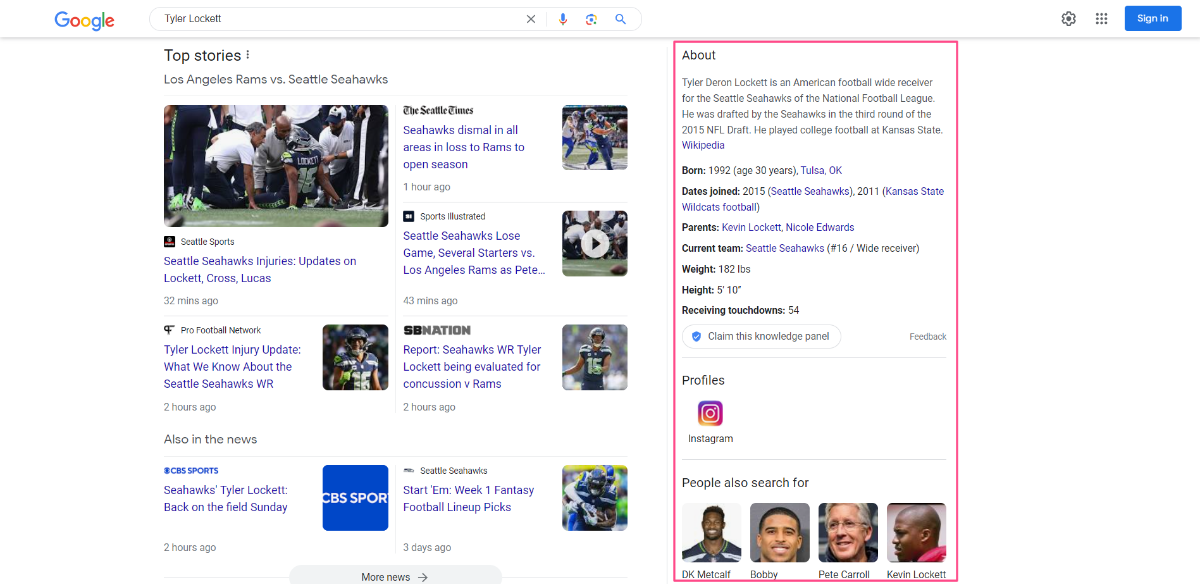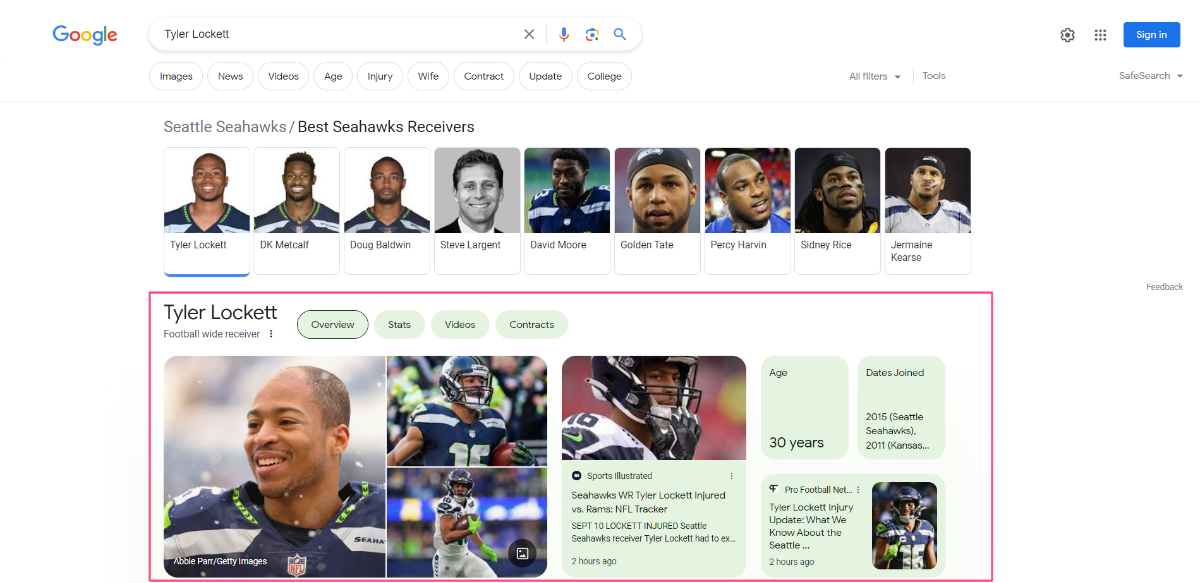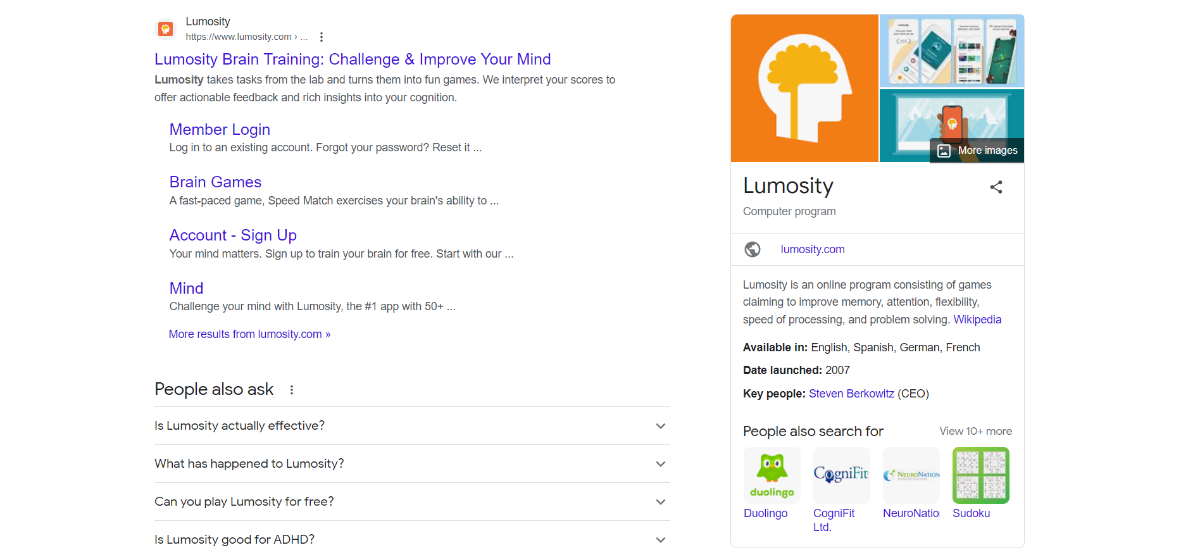What is Google Knowledge Panel? Its Impact and SEO Insights

Hand off the toughest tasks in SEO, PPC, and content without compromising quality
Explore ServicesEver searched on Google and noticed a summary box on the right about a person, place, or organization? That’s the Google Knowledge Panel in action. Google’s Knowledge Panel is a testament to the search engine’s evolution, offering users a snapshot of essential details without having to click on any search result.
But what is Google Knowledge Panel, and why has it become such a prominent feature in search results?
By the end of this guide, you’ll have a firm grasp of
- what the Google Knowledge Panel is,
- why it’s important to your search engine optimization (SEO) efforts,
- and how you can optimize your website for the Google Knowledge Panel.
What Is Google Knowledge Panel?
Launched in 2012, the Google Knowledge Panel appears on Google’s search results pages. It gives users a brief overview of their search topic, whether it’s a person, place, event, organization, or concept. A SERP feature that is designed to enhance the user’s search experience by delivering concise and relevant information at a glance.
The information displayed in the Google Knowledge Panel is brought to you by something called the Google Knowledge Graph. You can think of the Knowledge Graph as the intricate brain processing the world’s information, while the Knowledge Panel is its user-friendly face, presenting the gathered data in an easily digestible format on the search results page.
Learn more: Interested in broadening your SEO knowledge even further? Check out our SEO glossary, where we’ve explained over 250+ terms.
Where Does the Knowledge Panel Appear?
When a search is conducted, the Knowledge Panel typically appears on the right side of the search results, especially on desktop views.

Notably, these panels can also feature images relevant to the search query. Google sources these images from various resources. For instance, individuals who have claimed their Knowledge Panels can select a featured image. Meanwhile, images for other entities, such as landmarks or organizations, provide a preview from Google Images results for that entity, and these are automatically sourced from across the web.

Due to screen size constraints on mobile devices, the Google Knowledge Panel often appears toward the top, just below the search bar. It stands out from the regular search results, often accompanied by images, and provides a summarized version of the topic in question.

What Triggers a Knowledge Panel?
A wide variety of searches can trigger the appearance of a Knowledge Panel. These include:
- People: Celebrities, politicians, authors, and other notable public figures.
- Locations: Cities, countries, landmarks, and tourist attractions.
- Brands: Companies, organizations, or products.
- Events: Historical events, festivals, or upcoming occasions.
- Concepts: Broad ideas or topics that have a significant amount of information available.
How Does Google Source Data for the Knowledge Panel?
Google aggregates data for its Knowledge Panels from various reputable sources. Some of the primary sources include:
- Wikipedia: A vast majority of the information, especially for notable figures and places, comes from Wikipedia entries.
- The CIA World Factbook: For country-specific data, such as population, area, and economic statistics.
- Licensed data: Google also partners with various organizations and databases to pull specific information.
- User-generated content: Google My Business listings and user reviews can also influence the data displayed, especially for businesses.
It’s worth noting that while Google strives for accuracy, the data in the Knowledge Panel is aggregated from multiple sources, and there might be occasional discrepancies. However, Google provides options for users and entities to suggest edits, ensuring the information remains up-to-date and accurate.
Why Is Google Knowledge Panel Important?
Now you have an understanding of what the Google Knowledge Panel is, let’s delve into its importance.

Emphasis on High-Quality Content
- Prioritizing relevant information: The Knowledge Panel is designed to display the most relevant and high-quality content related to a user’s search query.
- User-centric content: Websites that focus on providing valuable information to users, answering their queries comprehensively, and maintaining up-to-date content are more likely to be featured prominently in the Knowledge Panel.
Importance of Semantic Search
- Understanding search intent: Google has evolved from mere keyword matching to understanding the intent behind a search—known as semantic search. The Knowledge Panel reflects this by providing information that aligns with the user’s intent.
Enhancing Local Search Experience
- User reviews and social Media influence: While the Knowledge Panel and Google My Business are distinct SERP features, user reviews and social media profiles can influence the information displayed in the Knowledge Panel. For instance, a restaurant’s rating or a celebrity’s latest tweet might appear, offering a more comprehensive view of the entity in question.
FAQs
How to rank for Google Knowledge Panel?
Ranking for the Google Knowledge Panel is not a straightforward process, as it’s not a typical search result. However, there are several best practices you can follow:
- Ensure accuracy and relevance: Ensure your website and other online profiles provide accurate, up-to-date, and relevant information about the entity (person, place, organization, etc.) you want to rank for.
- Optimize for SEO: While the Knowledge Panel isn’t a traditional search result, SEO best practices still apply. Ensure your website is optimized for search engines, especially for long-tail keywords related to the entity.
- Establish authority: Google tends to prioritize authoritative sources. Gain backlinks from reputable websites, engage in guest posting, and ensure your content is of high quality.
- Utilize structured data: Implementing schema markup on your website can help Google understand the context and relevance of your content, increasing the chances of appearing in the Knowledge Panel.
What Does Claiming a Google Knowledge Panel Do?
Claiming a Google Knowledge Panel gives you more control over the information displayed. Once you’ve verified your identity and claimed your panel:
- Edit and update information: You can suggest edits to the information displayed, ensuring accuracy and relevance.
- Choose featured images: Individuals and organizations can select a preferred image to be displayed prominently in their Knowledge Panel.
- Direct feedback: Claiming allows you to provide direct feedback to Google about the panel’s content, ensuring it remains up-to-date and accurate.
- Enhance credibility: A claimed Knowledge Panel can enhance the entity’s credibility, as users can be more confident in the accuracy of the information presented.
Can Anyone Get a Google Panel?
Not necessarily. Google Knowledge Panels are generated for widely recognized entities with significant authoritative information available online, including celebrities, businesses, landmarks, and other notable figures or organizations. However, with the proper optimization and online presence, lesser-known entities can also increase their chances of getting a Knowledge Panel.
Conclusion and Next Steps
Whether you’re scaling a business, building a personal brand, or simply keen on mastering SEO, the Google Knowledge Panel is your gateway to visibility. However, understanding is just the first step.
That is precisely where Loganix steps up to the plate.
With a team of experts dedicated to ensuring that your content is optimized, authoritative, and ready to be showcased in features like the Knowledge Panel, Loganix is your partner in navigating the ever-evolving world of search engine optimization.
🚀 Discover how Loganix’s suite of SEO Services will empower your SEO journey today. 🚀
Hand off the toughest tasks in SEO, PPC, and content without compromising quality
Explore ServicesWritten by Adam Steele on October 12, 2023
COO and Product Director at Loganix. Recovering SEO, now focused on the understanding how Loganix can make the work-lives of SEO and agency folks more enjoyable, and profitable. Writing from beautiful Vancouver, British Columbia.





